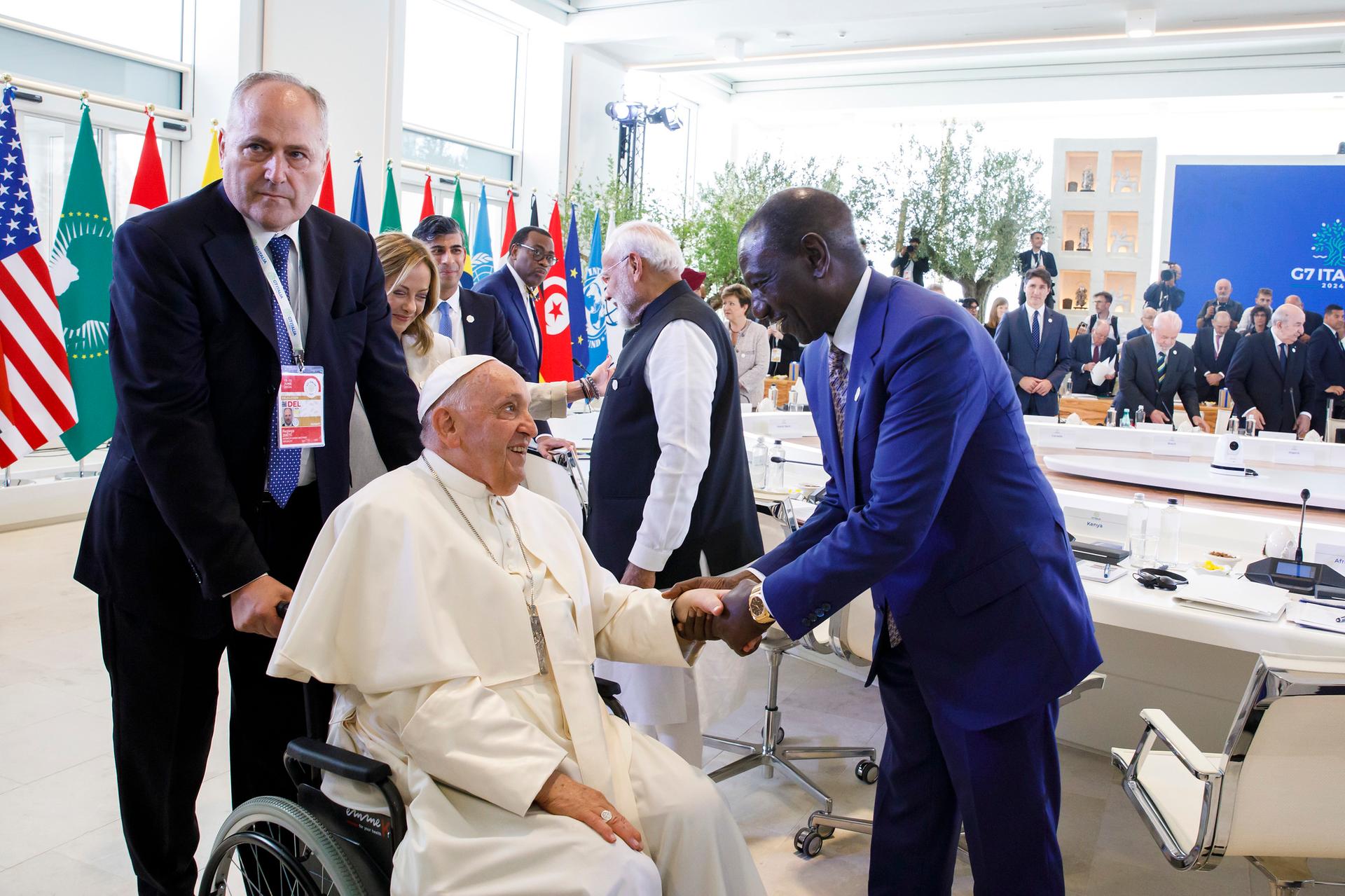YAOUNDÉ, Cameroon – Kenyan President William Ruto has joined Pope Francis in calling for peace in Africa, including an end to conflict in the Democratic Republic of Congo, Central African Republic, Sudan and South Sudan.
Addressing the G7 members in Apulia, Italy, the Kenyan president painted a disturbing picture of a world torn by conflict, and the horrible humanitarian toll they have inflicted on humanity.
“In Sudan, hundreds of thousands have died; millions are displaced and face starvation. In the Middle East, the conflict in Gaza has claimed tens of thousands of lives, devastated the livelihoods of millions, and caused global economic shockwaves,” Ruto said on June 15.
“Europe is grappling with a major conflict that has brought unthinkable carnage and widespread economic disruption,” he said, and added that the world finds itself “in the grip of relentless global challenges of unprecedented magnitude.”
“Only effective collective action by the international community can offer a reasonable chance of managing and overcoming these challenges,” he stated.
Ruto narrowed it down to the conflict in South Sudan, highlighting the role of the “Tumaini (Hope) Initiative” co-sponsored by the government of Kenya and the Rome-based Sant’Egidio Community – a lay Catholic association dedicated to the provision of social services and arbitrating conflicts.
The initiative that started on May 9 in Nairobi is a South Sudan peace talks between the government and the opposition parties who did not sign the 2018 peace deal facilitated by the Kenyan government at the request of President Salva Kiir.
“We are encouraged that the Tumaini Initiative that is co-sponsored by the Sant’ Egidio Catholic Community in Rome Italy, and the government of Kenya is yielding fruits in bringing lasting peace in South Sudan,” Ruto said after his June 14 meeting with Pope Francis.
On June 13, opposition parties taking part in the Nairobi talks issued a statement, outlining their expectations from the discussions.
“South Sudan is teetering on the precipice of disaster. All parties agree on the need for it to be rescued. On this account, we welcome the Tumaini Initiative as a last golden opportunity to rescue South Sudan from collapse and disintegration,” the statement reads.
The statement called on the international community to support South Sudan in its quest for peace, and a smooth transition to democracy and stability, especially with elections scheduled to come up later this year.
“We aim to rescue South Sudan from the specter of collapse and chaos and embark on the twin processes of state and nation-building to deliver a peaceful, just, and prosperous South Sudan for all,” the statement said.
South Sudan’s conflict began as a political dispute in December 2013 within the ruling Sudan People’s Liberation Army (SPLA), escalating into a civil war with ethnic dimensions. Disagreements between President Salva Kiir and former Vice President Riek Machar led to widespread violence, targeting civilians based on ethnicity and political loyalties. The war has resulted in nearly 400,000 deaths, torn the country’s social fabric, destroyed infrastructure, and left deep mental health scars among survivors
Religious leaders in South Sudan have welcomed the Tumaini Initiative, saying they are hopeful that it will bring lasting peace.
Father John Gbemboyo, Social Communication Coordinator of the Sudan Catholic Bishops’ Conference (SCBC), said “it’s a good initiative and we are always grateful to hear about an initiative for lasting peace in our country.”
“The peace talks bring us a message of hope. We are yet to know the details of what they are discussing, but we know that any peace talks which is aimed for the good of the country and for the people of the country, for us especially is welcomed, and we appreciate the move and we hope that in the future they will avail to us the details of the discussions and we will be happy to know the progress made for everlasting peace in the country, leaving nobody behind,” he told Crux.
Gbemboyo said a return to peace is critical if the country must be able to deal with a pervasive economic crisis.
He said civil servants have gone for seven months without a salary and noted that “life in South Sudan is budgeted for by God because you can’t imagine somebody not receiving salary and living.”
He talked about hunger and starvation and how people have had to eat leaves and wild fruits in order to survive.
“Unfortunately, many people have died from these eating habits,” Gbemboyo told Crux. He warned that the forth-coming rainy season will lead to floods, worsening an already dire situation of hunger and starvation.
After his meeting with the pope, Ruto expressed confidence that the warring parties will agree to stop fighting and give peace a chance.














